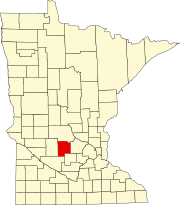Cedar Mills, Minnesota
Cedar Mills, Minnesota | |
|---|---|
 Location of Cedar Mills within Meeker County, Minnesota | |
| Country | United States |
| State | Minnesota |
| County | Meeker |
| Area | |
• Total | 0.34 sq mi (0.88 km2) |
| • Land | 0.34 sq mi (0.88 km2) |
| • Water | 0 sq mi (0 km2) |
| Elevation | 1,096 ft (334 m) |
| Population | |
• Total | 45 |
• Estimate (2012[3]) | 45 |
| • Density | 132.4/sq mi (51.1/km2) |
| Time zone | UTC-6 (Central (CST)) |
| • Summer (DST) | UTC-5 (CDT) |
| FIPS code | 27-10468[4] |
| GNIS feature ID | 0641029[5] |
Cedar Mills is a city in Meeker County, Minnesota, United States. The population was 45 at the 2010 census.[6]
History
Cedar Mills was laid out in 1860, and named for nearby Cedar Lake.[7] A post office called Cedar Mills was established in 1870, and remained in operation until 1955.[8]
Geography
According to the United States Census Bureau, the city has a total area of 0.34 square miles (0.88 km2), all of it land.[1]
Minnesota State Highways 7 and 22 are two of the main routes in the community.
Demographics
| Census | Pop. | Note | %± |
|---|---|---|---|
| 1950 | 99 | — | |
| 1960 | 96 | −3.0% | |
| 1970 | 81 | −15.6% | |
| 1980 | 73 | −9.9% | |
| 1990 | 80 | 9.6% | |
| 2000 | 53 | −33.7% | |
| 2010 | 45 | −15.1% | |
| 2015 (est.) | 44 | [9] | −2.2% |
2010 census
As of the census[2] of 2010, there were 45 people, 23 households, and 14 families residing in the city. The population density was 132.4 inhabitants per square mile (51.1/km2). There were 24 housing units at an average density of 70.6 per square mile (27.3/km2). The racial makeup of the city was 93.3% White, 2.2% Asian, and 4.4% from two or more races.
There were 23 households of which 13.0% had children under the age of 18 living with them, 52.2% were married couples living together, 8.7% had a female householder with no husband present, and 39.1% were non-families. 39.1% of all households were made up of individuals and 17.4% had someone living alone who was 65 years of age or older. The average household size was 1.96 and the average family size was 2.57.
The median age in the city was 49.3 years. 13.3% of residents were under the age of 18; 6.7% were between the ages of 18 and 24; 24.3% were from 25 to 44; 35.6% were from 45 to 64; and 20% were 65 years of age or older. The gender makeup of the city was 35.6% male and 64.4% female.
2000 census
As of the census[4] of 2000, there were 53 people, 26 households, and 15 families residing in the city. The population density was 121.8 people per square mile (46.5/km²). There were 27 housing units at an average density of 62.0 per square mile (23.7/km²). The racial makeup of the city was 100.00% White.
There were 26 households out of which 23.1% had children under the age of 18 living with them, 46.2% were married couples living together, 7.7% had a female householder with no husband present, and 42.3% were non-families. 42.3% of all households were made up of individuals and 11.5% had someone living alone who was 65 years of age or older. The average household size was 2.04 and the average family size was 2.80.
In the city the population was spread out with 22.6% under the age of 18, 5.7% from 18 to 24, 30.2% from 25 to 44, 17.0% from 45 to 64, and 24.5% who were 65 years of age or older. The median age was 41 years. For every 100 females there were 96.3 males. For every 100 females age 18 and over, there were 95.2 males.
The median income for a household in the city was $36,875, and the median income for a family was $51,875. Males had a median income of $35,000 versus $23,750 for females. The per capita income for the city was $17,998. None of the population and none of the families were below the poverty line.
References
- ^ a b "US Gazetteer files 2010". United States Census Bureau. Archived from the original on 2012-01-24. Retrieved 2012-11-13.
{{cite web}}: Unknown parameter|deadurl=ignored (|url-status=suggested) (help) - ^ a b "American FactFinder". United States Census Bureau. Retrieved 2012-11-13.
- ^ "Population Estimates". United States Census Bureau. Archived from the original on 2013-06-17. Retrieved 2013-05-28.
{{cite web}}: Unknown parameter|deadurl=ignored (|url-status=suggested) (help) - ^ a b "American FactFinder". United States Census Bureau. Archived from the original on 2013-09-11. Retrieved 2008-01-31.
{{cite web}}: Unknown parameter|deadurl=ignored (|url-status=suggested) (help) - ^ "US Board on Geographic Names". United States Geological Survey. 2007-10-25. Retrieved 2008-01-31.
- ^ "2010 Census Redistricting Data (Public Law 94-171) Summary File". American FactFinder. U.S. Census Bureau, 2010 Census. Archived from the original on 21 July 2011. Retrieved 23 April 2011.
{{cite web}}: Unknown parameter|deadurl=ignored (|url-status=suggested) (help) - ^ Upham, Warren (1920). Minnesota Geographic Names: Their Origin and Historic Significance. Minnesota Historical Society. p. 338.
- ^ "Meeker County". Jim Forte Postal History. Retrieved 21 July 2015.
- ^ "Annual Estimates of the Resident Population for Incorporated Places: April 1, 2010 to July 1, 2015". Retrieved July 2, 2016.
- ^ "Census of Population and Housing". Census.gov. Archived from the original on May 11, 2015. Retrieved June 4, 2015.
{{cite web}}: Unknown parameter|deadurl=ignored (|url-status=suggested) (help)

